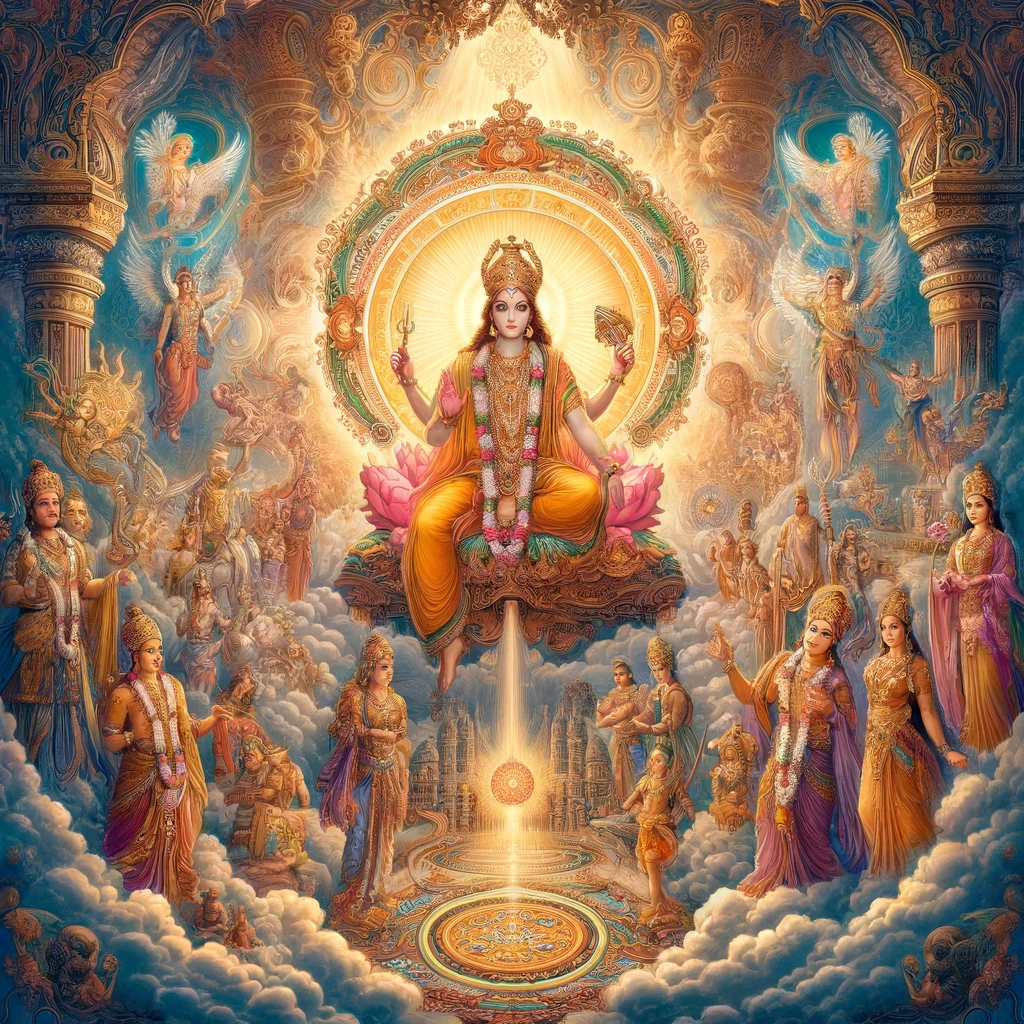ಆವರ್ತನೋ (ಅ)ನಿವೃತ್ತಾತ್ಮಾ ಸಂವೃತಃ ಸಂಪ್ರಮರ್ದನಃ
ಅಹಃಸಂವರ್ತಕೋ ವಹ್ನಿ ಅನಿಲಃ ಧರಣೀಧರಃ || 25 ||
āvartano (a)nivṛttātmā saṃvṛtaḥ saṃpramardanaḥ
ahaḥsaṃvartako vahni anilaḥ dharaṇīdharaḥ || 25 ||
"ಆವರ್ತನ" (Āvartana)
Means the one who continuously revolves or cycles the creation. This creation (Brahmanda) was created long ago and one day it will be non-existent. The one that has a beginning will have an end. Every 31,104 thousand crores human years there will be great dissolution. At that point the visible universe will be destroyed. One again after 31,104 thousand crores human years the universe will be created. Besides the great deluge happening every 31,104 thousand crores human years, every 432 crores human year there will be an interim dissolution, and every 31 crores human years there will be a small dissolution. This cyclical process of creation and dissolution repeats endlessly, emphasizing the continuous and eternal nature of this cosmic cycle. The Supreme Being, as the eternal overseer, ensures that this cycle of creation and dissolution continues without interruption and is known as Āvartana. This concept is often associated with the idea of an infinite and unending cosmic order. He is also called Anantha Koti Brahmanda Nayaka and he manifests as the controller of all energies. Āvarta also means an "obstacle," "challenge," or "difficulty." Where we experience, Āvarta (obstacles, challenge, or difficulties), God will help resolve the Āvarta and is known as Āvartana. Everyone faces challenges in life. Even gods and goddesses are not exempt from them. An excellent example of this is Yudhishthira and Draupadi. Yudhishthira, the incarnation of righteousness, and Draupadi, the embodiment of virtue, faced immense difficulties. We all know the trials they went through. The Supreme Being gives us roles in our lives, and it is our duty to fulfill them. Life brings us various experiences, and it is our responsibility to savor them. Embracing and overcoming the challenges of life is what life is all about. The Supreme Being, who is the eternal overseer, is always there to protect us. This belief is encapsulated in the concept of 'Sri Raksha,' the divine protection of the Supreme Being.
(ಅ)ನಿವೃತ್ತಾತ್ಮಾ ((A)nivṛttātmā)
This name can be pronounced in two forms: 'Nivruttatma' and 'Anivruttatma.' The one who is unattached or independent and by whose grace we can attain unattachment or independence is Nivruttatma. On the other hand, 'Anivruttatma' can be broken down as follows: 'Ani' means 'life,' and 'Vruttatma' means 'the one who resides. In this context, it refers to the Supreme Being who resides as the inner controller in all living beings. The Lord is often referred to as 'Ani' in the sense that He is always the inner guide and companion of all living entities, particularly as the inner controller of the life force, Prana Deva or Lord Hanuman.
ಸಂವೃತಃ (saṃvṛtaḥ)
"ಸಂವೃತಃ" (saṃvṛtaḥ) means "one who is concealed" or "the one who resides hidden." It refers to the Supreme Being, who dwells within the cave of the heart, hidden from external perception. This concept emphasizes the inner presence of the divine within every individual, representing the indwelling God or the Divine Consciousness. The Supreme Being is often described as the repository of infinite divine qualities and virtues, symbolizing the ocean of divine attributes."
In essence, "ಸಂವೃತಃ" (saṃvṛtaḥ) highlights the idea of the Divine residing within the depths of the heart, concealed from ordinary sight but ever-present as the source of all virtues and goodness.
ಸಂಪ್ರಮರ್ದನಃ (saṃpramardanaḥ)
In Sanskrit dictionary or lexicon that focuses on words and terms that consist of only one syllable or one akshara (letter) Is known as Ekashara Kosha. In Sanskrit, each letter is considered a syllable, and many words can be composed of a single akshara (letter). In the Ekashara kosha mainly it has eleven syllable; and there are special meanings associated with these eleven syllable. These are Aa, Kaa, Ya, Pra, Vi, Sum, Bhu, Maa, Sa, Ka, and Ha. For example, “Hara”, if we Prefix “Sum” to this it becomes “Sumhara”, if we Prefix “Pra” it becomes “Prahara”, if we add “Vi” it becomes “Vihara”.
"ಸಂಪ್ರಮರ್ದನಃ" (saṃpramardanaḥ) is composed of the following elements:
"ಸಂ" (saṃ) signifies completeness or totality.
"ಪ್ರ" (pra) indicates excellence or mastery.
"ಮರ್ದನ" (mardana) means the act of grinding or crushing.
When these elements are combined, "ಸಂಪ್ರಮರ್ದನಃ" (saṃpramardanaḥ) signifies someone who with no partiality imparts complete excellent knowledge, imparting profound wisdom, and finally destroys our mortal body and gives us salvation (mukti).
ಅಹಃಸಂವರ್ತಕಃ (ahaḥ saṃvartako)
Aha can be understood as “Ahhaha” and “Ahum”. Daylight and the cause for daylight Sun, “Ahhaha” and the one that we cannot live without that is “Ahum”. As mentioned in the Gita
ನ ತದಸ್ತಿ ವಿನಾ ಯತ್ ಸ್ಯಾನ್ಮಯಾ ಭೂತಂ ಚರಾಚರಂ (ಅ-೧೦, ಶ್ಲೋ-೩೯) Na Tadasti Vina Yat Sanmaya Bhutam Characharam (A-10, Shlo-39), meaning besides me in this universe nothing is independent and cannot exists independently. Hence the one that is present and sets into motion this material body (pindanda) and universe (bramanda) is ಅಹಃಸಂವರ್ತಕಃ (ahaḥ saṃvartako).
ವಹ್ನಿ (vahni)
Vahni (ವಹ್ನಿ) Vahni means a vehicle or carrier. According to our karma, we will reach wherever we are destined to. Vahni is the divine force that carries liberated souls to liberation and is the ordained deity of all gods and goddesses, including Lord Brahma."
Anilaḥ (ಅನಿಲಃ)
Anila means 'wind,' one of the five elements (Panchabhutas), and is commonly referred to as 'air.' However, its etymological meaning gives a significantly different interpretation. 'Nila' means 'dwelling' or 'abode,' which implies a place of refuge or shelter. The term 'A-nila' can be understood as the Lord who resides as the refuge for everyone, protecting all beings, not dependent on the shelter of others. He is Anilaḥ.
Dharaṇīdharaḥ (ಧರಣೀಧರಃ)
Dharaṇīdhara signifies 'the upholder of the Earth.' This term represents the benevolent deity who, in the Vāmana (dwarf) incarnation, restored the Earth to its rightful orbit when it had deviated. Dharaṇīdharaḥ is the divine protector who firmly oversees and guides all celestial bodies and planets.


